|
Scientist serves EPA to integrate health, environment, law
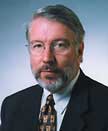 The U.S. Environmental Protection Agency (EPA) recently asked Ronald J. Kendall (fisheries and wildlife '80 Ph.D.) to serve a second year as chair of its Scientific Advisory Panel (SAP). Kendall is director of The Institute of Environmental and Human Health (TIEHH) and head of the graduate department of environmental toxicology at Texas Tech University. The U.S. Environmental Protection Agency (EPA) recently asked Ronald J. Kendall (fisheries and wildlife '80 Ph.D.) to serve a second year as chair of its Scientific Advisory Panel (SAP). Kendall is director of The Institute of Environmental and Human Health (TIEHH) and head of the graduate department of environmental toxicology at Texas Tech University.
The SAP provides the scientific analysis and interpretation behind EPA's regulatory decisions. The panel's role is particularly important as the EPA implements the Food Quality Protection Act and the Federal Insecticide, Fungicide, and Rodenticide Act. Increased concerns for children exposed to pesticides and chemicals, for example, have necessitated new environmental policies and new ways of evaluating the effects of chemicals on the human endocrine system. "This is an extremely important, entirely new area of science, with enormous importance for health and quality of life," Kendall explained.
Kendall enjoys the ability to practice cutting-edge science. "I'm constantly receiving state-of-the-art scientific questions to address, and I have the opportunity to work with the best scientists in not only the nation, but around the world," he said. "It has been very scientifically fulfilling."
After more than a decade of consulting for SAP, Kendall also recently became a permanent member. Permanent members serve four-year terms, and only seven are chosen from several hundred consultants.
Customer service pays off for New Jersey alumnus
 Michael Michalowicz (finance '93) received
the Young Entrepreneur Award for the state of New Jersey from the National Small Business Association
in recognition of his firm's tremendous growth and
profitability. Michalowicz and his partner have built
their network-integration firm, Olmec Systems
(www.olmec.com), from a two-person operation
with two clients in 1996 to a 20-person outfit that
pulled in over $2 million in revenue this year. The key
to their remarkable success? According to
Michalowicz, the answer is simple: customer service. "We have
a genuine focus on taking care of every aspect of
the process for the customerfrom making sure everything that needs to be done is done right the
first time to being quick and responsive when
problems do arise," Michalowicz said. With over 150
active clients today, the company plans to broaden its
service scope and move toward national expansion. Michael Michalowicz (finance '93) received
the Young Entrepreneur Award for the state of New Jersey from the National Small Business Association
in recognition of his firm's tremendous growth and
profitability. Michalowicz and his partner have built
their network-integration firm, Olmec Systems
(www.olmec.com), from a two-person operation
with two clients in 1996 to a 20-person outfit that
pulled in over $2 million in revenue this year. The key
to their remarkable success? According to
Michalowicz, the answer is simple: customer service. "We have
a genuine focus on taking care of every aspect of
the process for the customerfrom making sure everything that needs to be done is done right the
first time to being quick and responsive when
problems do arise," Michalowicz said. With over 150
active clients today, the company plans to broaden its
service scope and move toward national expansion.
But building his business isn't the only thing
on his mind. Stop by Michalowicz's office at the
right time and you might find him strumming the
blues on the guitar he keeps next to his desk. Or you
might see him at a West Virginia game cheering on
the Hokies from the stands of the rivals. But you
won't find him playing lacrosse. After playing
throughout high school and college, he swore off the sport
when he left Tech, and he's only slipped once since
graduation.
Alumnus fights hunger here and abroad
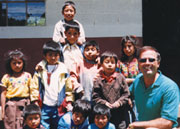 As a board member of World SHARE for
seven years, and chair for four, alumnus Ron Powers
(economics '69 ) has volunteered countless hours to
fight hunger in the U.S. and abroad. Seeing firsthand
what it takes to feed the world's hungry has shown
him the finite nature of earth's resources. Many would
be paralyzed by such a prospect, but Powers,
motivated by "a real sense of trying to help," has chosen
instead to take action through SHARE. As a board member of World SHARE for
seven years, and chair for four, alumnus Ron Powers
(economics '69 ) has volunteered countless hours to
fight hunger in the U.S. and abroad. Seeing firsthand
what it takes to feed the world's hungry has shown
him the finite nature of earth's resources. Many would
be paralyzed by such a prospect, but Powers,
motivated by "a real sense of trying to help," has chosen
instead to take action through SHARE.
SHARE (Self Help and Resource Exchanges) is
a nonprofit organization that provides food
discounts in return for two hours of community service
a month. "Community service can mean anything
from helping an elderly person to coming to the SHARE warehouse to bag food," explained Powers. "If
someone buys a bag of food for $14, they're getting a
$30 value because SHARE buys food in bulk." A belief
in fostering self-reliance lies at the heart of the
SHARE philosophy.
SHARE-USA began in 1983 and operates
today through affiliates in 23 states, as well as in
Mexico and Guatemala. World SHARE oversees that
entire network. International programs include an
overseas coffee program to support the Mexican economy,
a SHARE pharmacy, and health-monitoring and nutritional programs in Mexico and Guatemala. "We
tried different approaches continuously to impact
their lives in positive ways, and I think we have,"
Powers said of the two countries.
World SHARE currently serves over
250,000 families each month, has generated
approximately nine million hours of volunteer service, and is
entirely supported by the efforts of volunteers
like Powers.
World-famous mammal expert dies
Charles Handley Jr. (pre-med '44), a renowned scientist, author, and teacher, died at the age of 75 on June 9. 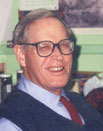 Handley Jr. developed a love of nature from his father, Charles Overton Handley Sr., Virginia Tech's first professor and director of wildlife conservation. Handley Jr. earned an M.S. and Ph.D. in zoology from the University of Michigan and worked for the Smithsonian Institution for 53 years. Handley Jr. developed a love of nature from his father, Charles Overton Handley Sr., Virginia Tech's first professor and director of wildlife conservation. Handley Jr. earned an M.S. and Ph.D. in zoology from the University of Michigan and worked for the Smithsonian Institution for 53 years.
As curator of mammals at the National
Museum of Natural History, Handley Jr. was generally
regarded as the world's foremost expert on Latin American
bats. At the time of his death, he was working on a
new book, Handbook of Amazon Bats, which will be
published in the future. He also wrote more than
200 scientific publications and two books, including
Wild Mammals of Virginia and Mammals of the
Smithsonian Venezuela Project.
A pioneer at heart, Handley Jr. traveled the
world discovering and analyzing new and existing
species. His travels included numerous arctic expeditions,
a decade of annual visits to inventory the mammals
of Panama, nine expeditions to the islands of Bocas
del Toro, and many more. He also took part in a
seven-month Harvard University expedition to the
Kalahari Desert in 1952 to study stone-age Bushmen.
During his career, Handley Jr. won the Smithsonian's
Outstanding Performance Award, the Virginia Museum of Natural History Foundation's Thomas Jefferson Medal for outstanding contributions to natural
history, and a certificate of appreciation for
conservation of endangered species from the Virginia
Department of Game and Inland Fisheries.
In honor of his extensive contributions,
several species were named for him, including a
hummingbird, long-tongued bat, mouse possum, pygmy
mouse, and wingless bat fly.
First-Class Reunions keeps competition on its toes
When Kristen Shiveley (communication
studies '85) attended her 10-year high school reunion
in Vienna, Va., she came away with an idea that
sparked her entrepreneurial spirit. Why not start a high
school reunion planning company and do a better job
than the competition? She founded First-Class
Reunions, Inc. in 1996 and set out to improve the industry.
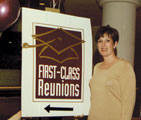 "My mission was to be the best, and within
the first two years we became the best and the largest
high school reunion planning company in the D.C.
Metropolitan area. We have doubled business every
year since inception," Shiveley said. "My mission was to be the best, and within
the first two years we became the best and the largest
high school reunion planning company in the D.C.
Metropolitan area. We have doubled business every
year since inception," Shiveley said.
Shiveley insists on providing flexibility and
outstanding customer service. From the venue to
the promotional pieces, every reunion reflects the
individual character of the class. "The day we become
a cookie-cutter organization is the day we close
our doors," she said. Other perks include an
award-winning memory book, creative ice-breakers, and
candid digital photos taken during the reunion.
"What has really been rewarding, and what
I'm most proud of, is coming into a market and not
only meeting the needs of local graduates, but raising
the bar with competitors," Shiveley said. "I wanted
to come in and make a difference, and I think we've
done that." In addition to founding First-Class
Reunions, Shiveley is the youngest person ever to attain
Certified Association Executive (CAE) designation
for association management.
In 1999, Tech's communications department invited Shiveley to speak at commencement. Her speech focused on cultivating "the entrepreneurial push." More information about First-Class Reunions is available through its website at www.fcreunions.com.
Lost class ring makes miraculous return
 A few months ago, just before returning to
campus for his 50-year class reunion, Joe Collie
(chemical engineering '50) got an amazing phone call.
His class ring, lost in the ocean nearly 20 years ago,
had been found by Mike Fuller of Naples, Fla. A few months ago, just before returning to
campus for his 50-year class reunion, Joe Collie
(chemical engineering '50) got an amazing phone call.
His class ring, lost in the ocean nearly 20 years ago,
had been found by Mike Fuller of Naples, Fla.
"To get a call that somebody found my ring
in the oceanit shocked me," Collie said. Collie
lost the ring while scuba diving in the Bahamas in
water 80-feet deep; Fuller found it in shallower water
approximately six miles away. Collie is amazed the
ring didn't sink into the soft ocean bottom or
disappear into one of the many coral reefs it must have
bypassed to reach this location.
Another interesting circumstance is the fact
that Fuller found the ring not long after it was lost in
the early 80s. When his initial contact with Tech
failed to locate an owner, Fuller held onto it for nearly
two decades through several moves. Prompted
recently to try again, he had better luck this time, but it
was still a close call. Everyone incorrectly assumed
that the graduation year inscribed on the ring was
1960. It wasn't until someone thought to check the
year 1950 that a graduate with initials J.H.C. in
Durham, N.C., could be found.
The ring certainly traveled a long way to get
back to its owner. Given the many quirks surrounding
its eventual return, Collie can only assume that "it
was meant to be."
Alumnus wins shot at a million
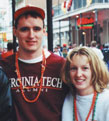 The friends of Scott Goodman (engineering
science and mechanics '95) have a long-standing joke bout his ability to remember the most unlikely
details. "I can't remember to pick up milk on the
way home, but I can remember a million details
about states, governments, and things like that," he
explains. He is so good at Trivial Pursuit that his wife
won't play against him anymore, though she doesn't
mind playing on the same team. And she definitely
didn't mind when his trademark penchant for trivia
earned him a spot on Who Wants to Be a
Millionaire? last spring. The friends of Scott Goodman (engineering
science and mechanics '95) have a long-standing joke bout his ability to remember the most unlikely
details. "I can't remember to pick up milk on the
way home, but I can remember a million details
about states, governments, and things like that," he
explains. He is so good at Trivial Pursuit that his wife
won't play against him anymore, though she doesn't
mind playing on the same team. And she definitely
didn't mind when his trademark penchant for trivia
earned him a spot on Who Wants to Be a
Millionaire? last spring.
Goodman beat extraordinary odds to win his
shot at a million by correctly (and quickly) answering
two rounds of call-in questions like "put the
following historical figures in order by birth" and "put the
following coins in order by country from North to South." Once on the show, luck was with him
again when he was asked a $32,000 question about
An Officer and a Gentleman, a movie he saw just last
year. He won on that question but missed the next
(worth $64,000): "If an Englishman weighs 10 stone,
how many pounds does he weigh?"
"For awhile I had trouble watching the show
because I would see easier $64,000 questions,"
he admits. But time (and of course $32,000) has
eased the disappointment.
A loyal Hokie, Goodman remembered his
alma mater during his moments on national
television: "They asked how my wife and I met, and I said,
'We met at college at Virginia Tech.' I plugged the
Hokies, but due to time constraints, it got edited out."
|